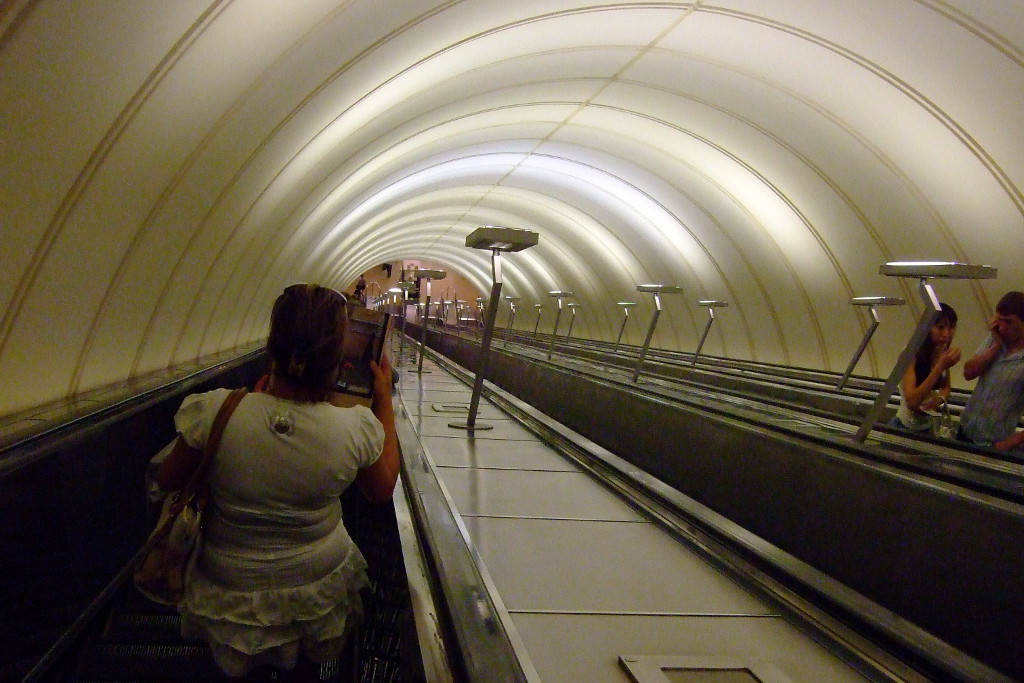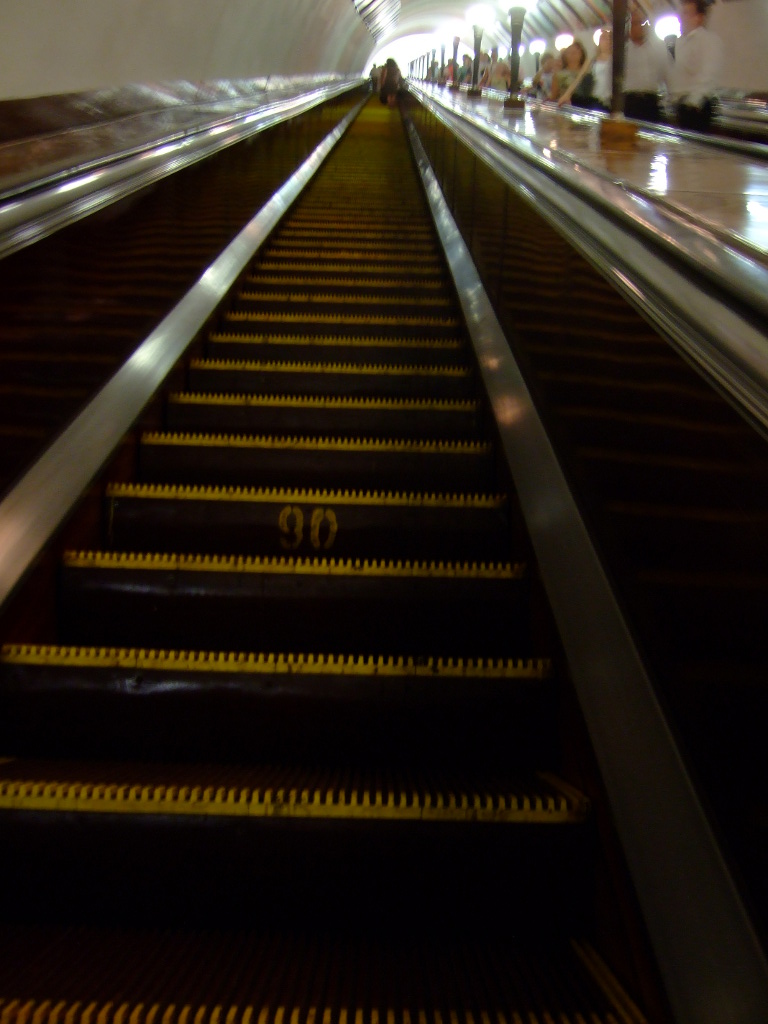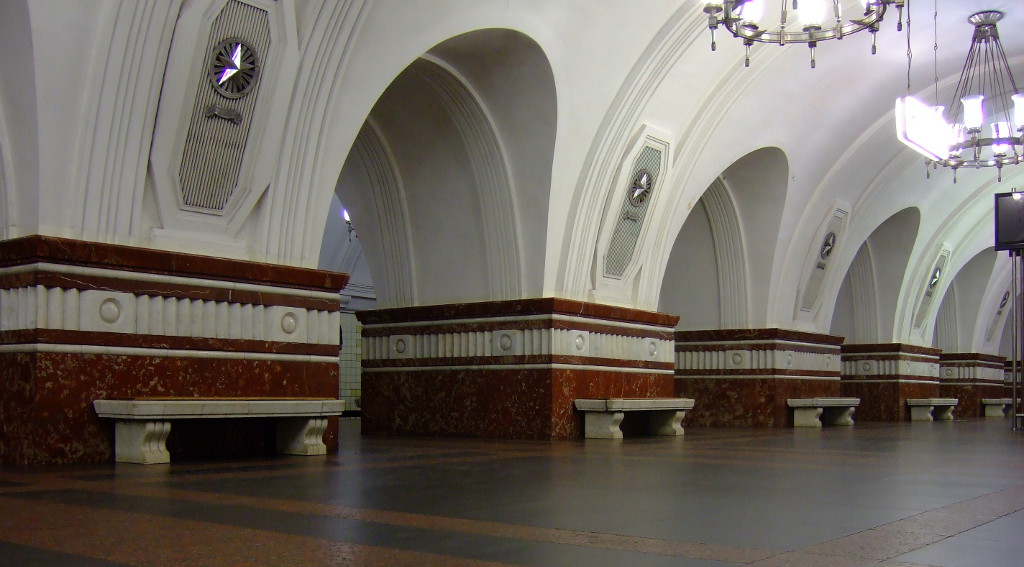Although it was hardly four in the morning when the Czech Lines’ airplane landed, dawn was already faintly breaking over the horizon. Moscow Sheremetyevo airport was barely awakening. To my surprise, the border-crossing procedure was much easier than what my former Russian experiences had made me expect. “This country –thought I– is not the shade of what it was: they no longer make you wait at the migration booths!” My suitcase, though, emerged from the baggage conveyor quite damaged: three supports lost, the mainstay broken, the main strap unfastened, and showing a few severe scratches all over. Luckily I didn’t pack the wine bottles I had thought of bringing, because the bag seemed not only ill handled, but also meanly treated. Too bad it’s not possible–even if only for narrowing down the discredit–to find who is the damage to be attributed: whether Barajas’ operators, Prague’s, Moscow’s or all alike. Sure, I understand that being a package handler is, perhaps, one of the least exciting jobs in our society; but those guys, for the purposes of entertaining themselves or venting their frustrations, rather than kicking the baggage, couldn’t they kick each other’s balls instead? Whatever…
As usual, for reaching the city at this early hour there is no other transportation means than the taxis; and that’s why half of the people in, or around, the airport terminal are neither passengers, nor airport employees, but taxi drivers (or go-getters) in search for travelers (or victims). Also –I was told– there are, from a not far away station, express trains which, for 500 rubles, link the city with the airport. But, in my insane desire for minimizing travel expenses, I opted for something drastically cheaper: the normal bus routes (#851 and #817) which, for only 28 rubles, will take you to the end of some subway line, where from you can finally reach almost any other spot in the great metropolis. The main drawback of these regular buses is that they don’t start running until 6 am; therefore, I had to wait for them almost two hours on a bench outside the terminal, as there is nowhere to sit down inside; and yet I was lucky to find a place in this bench!: other people who came afterwards had to wait standing. Fortunately it wasn’t cold.
When the bus finally arrived, it was already half full with passengers from the other terminals; and since, by then, there were quite a few low-cost travellers gathering around the bus stop bench, I was very lucky (or so I thought) to have the coach doors opened right in front of me, so that, once on board, I was able to take the only empty seat left: at the very end of the coach, between an overheated bulkhead and a guy who hadn’t seen a shower for a month, and whose clothes, indisputable brownish, had the faint shine, the colour of a fly’s wing, characteristic of the dirt tissue excessively handled. Not that this lack of hygiene on the part of my neighbor bothered me much, but it turned out that, with the heat coming from the bulkhead and underneath our sits, all that man’s filth reached the fermentation point and emanated nauseating vapors which kept me on the verge of puking for half an hour. But I had no escape, because on the landing right ahead of me a big traveler had improvised a seat on a heavy suitcase, thus forming an impassable barrier that forced me to stay where I was, doomed to my own luck until the end of the traject: Rechnoy Vokzal metro station.
The Moscow tube–deep, intricate and extensive–is a pharaonic engineering work. The escalators leading to the tunnels, as seen from the top, fade down there in a conical perspective of dizzy slope; and they’re so long that it takes ages to reach the end; an almost distressing feeling, as when descending down the shaft of a mine. The metro stations have a single central platform, the tracks running on both sides. They’re roomy and vaulty, sometimes majestic, and long: capable for the eight-car trains that, in an almost frantic succession, travel loud and shaky the undergrounds of Moscow. On a map, the subway lines ramify and extend as dendrites, near whose ends the stops are so far away from each other that, in some cases, you can take a good nap while covering the distance between them. And so i did: dozing in the half empty car as we progressed through the endless galleries, I imagined the city as moving above me at a sidereal speed, like if it was a fabulous electrical circuit whose nodes the train connected while running along the rails. This way I could mentally gauge Moscow’s huge dimensions. When, at last–twelve stations and two transfers later–I emerged to the surface again, the sun tinted in yellow the east sides of the buildings.
This was the third beltway of the city: a two-levelled, wide and noisy crossing of two main avenues carrying a busy and incessant traffic. My destination was close by: an apartment block of the communist style, parallelepiped, built with initially white brick that now was dirty and grey from the smoke of millions of vehicles. Beyond the shoddy and blind wooden gate, the tiny doorway welcomes me with its grim smile of half opened, pale green mailboxes showing their holes like a toothless mouth. The landings are paved with yellowish broken tiles, heavily patched; the grey steps are dirty and worn. The doors of the apartments are plain, and armoured like prison cells. Behind one of them appears Masha’s smile. A long hug, some kisses, a shower and a well deserved rest…




A long and exhausting journey for international love. And yet you still find time to write a detailed blog in two languages. Interesting. In fact, as interesting as a person with two jobs finding time to comment on a blog.
But when commenting on a blog, don’t you feel the pleasure of writing, the joy of communication? Isn’t it as enjoyable as working, if not more? Shouldn’t we try to find a balance in life, where there’s a moment for everything? Shouldn’t we try to evenly stow the stuff in our lives, instead of everything on the port or the starboard side?
Balancing acts are for circus performers. lol